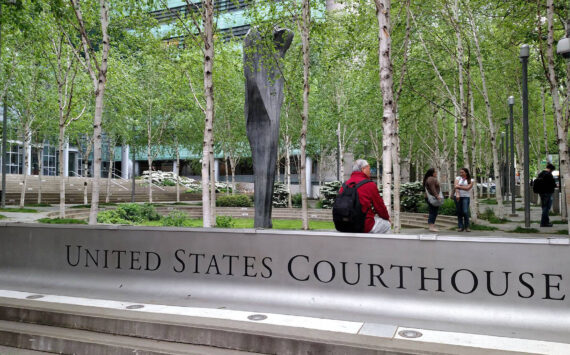When you think about it, it’s stunning how much of the public agenda today is driven by the business agenda. Transportation improvements? We need them to accommodate growth. Why? Because it’s inevitable, and the Growth Management Act requires that our communities plan for it, whether we want it or not. The mayor, the governor, and the city and county councils have little to do but facilitate that growth, promote economic “prosperity,” stimulate trade, and build all the infrastructure those enterprises require. If you look at our civic and state agendas, they are about little more than doing the business of big business.
Business groups form powerful lobbies and associations to push their agenda. The Building Industry Association of Washington, the Association of Washington Business, the Prosperity Partnership, countless lobbyists, pressure groups, alliances, committees, and roundtables. They demand tax breaks, subsidies, and incentives for doing business in our city and state. They demand higher gas taxes for road improvements to move their freight and employees. They demand schools that will produce workers instead of citizens. They demand that our lawmakers make their priorities the public’s priorities, and our elected officials respond with gusto.
At the national level, corporate power is driving a massive restructuring of our society by dismantling public programs that are purely for the benefit of individuals. They’ve made declaring personal bankruptcies more difficult while failing to rein in corporate misbehavior or usurious interest rates. They’ve blocked real health care reform to protect the private lack-of-health-care system. They’ve permitted pharmaceutical companies to come to market with drugs that aren’t fully tested, treating people like guinea pigs. They’re requiring taxpayers to pick up the tab for mismanaged companies that won’t fulfill their pension promises to employees, while, in the meantime, seeking to gut Social Security. Democrats and Republicans alike have embraced the idea that America has a destiny to dominate the world through free enterprise and unfettered trade, regardless of the consequences to the American people, let alone anyone else. The official agenda is endless growth and expansion.
These ideas are not simply ascendant, they are in our nation’s legal DNA. Once upon a time, America had slavery, and the courts considered it constitutional. A social and political revolution led by reformers changed that, and most of us today would never think of going back. But that revolution planted the seeds of a new transformation. Starting not long after the Civil War, American corporations began to accumulate power, not only as separate entities but as individuals. The courts have seen fit to grant corporations all the constitutional rights that people have. Many of the civil-rights laws that were implemented to protect African Americans and other minorities have been used by corporate America to expand their rights. People were once property, now property is people.
Individuals today have fewer rights than corporations. Individuals are protected by the Bill of Rights, but an American corporation gets that and more. It can exist in perpetuity; it has limited liability; it receives enormous tax breaks and government subsidies we mere people can only dream of; it has a regulatory system designed to protect and enable it. (Clear skies! Healthy forests!) To top it off, corporations avoid the responsibilities of citizenship: It is their right to behave as selfishly as possible. They can betray the public that ostensibly sanctions their existence.
The rights of man? They’re nothing compared to the rights of corporate man, a Frankenstein of increasing power.
If you don’t think it’s gotten bad, talk with the activists of the Program on Corporations, Law & Democracy. The Massachusetts- based nonprofit group’s co-founder, Richard Grossman, was in town last weekend teaching a “Democracy School” course that covers the history of the rise of corporate power in American. It also explores opportunities for a new kind of activism that avoids fights over regulatory issues and, instead, emphasizes reassertion of local control, including the right of states to control corporate behavior.
The group is testing that in the rural, Republican, red-state regions of Pennsylvania, where many townships are passing legislation to ban activities such as factory farming. Agribusiness and the state government have come down hard on communities that have tried to assert such rights. In one case, a local official, elected on an anti- gravel-mine platform, was forced to recuse himself from votes on the topic because he was “biased,” having expressed an opinion on the topic during a campaign! The threat of a corporate lawsuit that could have bankrupted the official and his township effectively muzzled an elected representative of the people. But some supporters are fighting back, contending that their civil rights have been violated. Seems like a no-brainer, but so far, the court has upheld the company’s right to bully the town into submission.
By forcing corporations to go to court and go on the record to assert rights that are legal but outrageously undemocratic, the challengers can raise public awareness. As Grossman says, the real story isn’t corporate illegality, it’s what they can do legally. Hope for the future lies in outing the extent to which our democracy has been undermined by corporate power, with the full collusion of the legal and political system. If that can be exposed, maybe then we’ll get angry enough to take our country—and our communities—back.







